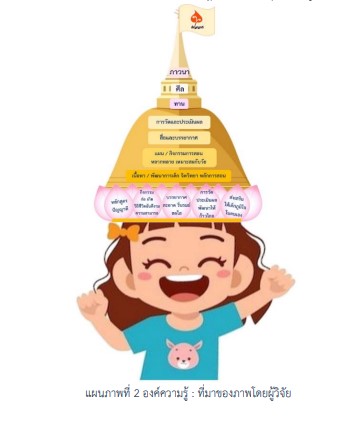MORAL CULTIVATION OF KINDERGARTEN STUDENTS BY USING BUDDHIST INTEGRATION
Main Article Content
Abstract
Dissertation on “Cultivating Morality in Kindergarten Students by Using Buddhist Integration” aims to reach the following objectives: 1. To study the principles of organizing education for kindergarten children. 2. To study the Buddhist principle to integrate and cultivate morality in kindergarten students, and 3. To propose the way to cultivate morality in kindergarten students by using Buddhist integration. This is qualitative research. There were 19 key informants/people participated in in-depth interview. Data were analyzed and presented in a descriptive analysis.
The research findings were 1. The kindergarten education principle must be organized to align with the country's educational development plan and align with the 4 developmental areas for children which relevant contents, variety of activities are organized and well integration of individual assessment. 2. Adopting the principles of giving, sharing, generosity and support. Precepts will promote well living together with respect each other, creating happiness. And meditation will promote the development of body, morality, mind, and wisdom. 3. Virtue can be instilled in kindergarten students through Buddhist integration in four aspects as follows: 1) Curriculum: Children with intelligence would bring their abilities to the world. To express kindness to others, have responsibilities, and reach their full potential. Learning content and lesson plans should encourage students to apply in their daily lives. 2) Organizing a variety of teaching and learning activities shall create good hygiene habits. Learning can happen anytime which lead to develop the habit of being a giver and use their intelligence to solve problems with happiness. 3) Media and atmosphere that are warm, cool, friendly would promote the passion for learning and creation. The cost-effective use of materials which could be modified from the surrounding media would be friendly to the environment. 4) Measurement and evaluation Individuals in various ways covering both good behavior towards the environment and towards others. Elevating the mind to ensure it won’t be falling into a gloomy way and use intelligence to creatively deal with problems, with right thoughts and knowledge.
Article Details

This work is licensed under a Creative Commons Attribution-NonCommercial-NoDerivatives 4.0 International License.
เรื่องลิขสิทธิ์/เป็นความคิดเห็นของผู้เขียน
References
เอกสารอ้างอิง :
หนังสือ :
ทิศนา แขมมณี. (2540). การคิดและการสอนเพื่อพัฒนากระบวนการคิด. กรุงเทพมหานคร: โครงการพัฒนาการเรียนการสอน สำนักงานคณะกรรมการการศึกษาแห่งชาติสำนักนายกรัฐมนตรี.
ธิดา พิทักษ์สินสุข. (2561). คู่มือพัฒนาทักษะสมอง EF Executive Functions สำหรับครูปฐมวัย. กรุงเทพมหานคร: บริษัท มติชน จำกัด.
มหาจุฬาลงกรณราชวิทยาลัย. (2539). พระไตรปิฎกภาษาไทย ฉบับมหาจุฬาลงกรณราชวิทยาลัย. กรุงเทพมหานคร: โรงพิมพ์มหาจุฬาลงกรณราชวิทยาลัย.
สำนักวิชาการและมาตรฐานการศึกษา สำนักงานคณะกรรมการการศึกษาขั้นพื้นฐาน กระทรวงศึกษาธิการ. (2560). หลักสูตรการศึกษาปฐมวัย พุทธศักราช 2560. กรุงเทพมหานคร: โรงพิมพ์ชุมนุมสหกรณ์การเกษตรแห่งประเทศไทย จำกัด.
วารสาร :
ประเวศ วะสี. (2542). วิสัยทัศนของกระบวนการเรียนรู้ในหลักสูตรการศึกษาขั้นพื้นฐาน. วารสารวิชาการ. 2(1) ;8-11.
อุษา แตงทอง. (มกราคม-มิถุนายน 2563). การพัฒนาจริยธรรมเด็กปฐมวัยกับจุดเริ่มต้นที่บ้าน ในบริบทสังคมไทย. วารสารวิชาการมนุษยศาสตร์และสังคมศาสตร์รำไพพรรณี. 1(1); 2563.
สัมภาษณ์ :
ธิดา พิทักษ์สินสุข. นายกสมาคมอนุบาลแห่งประเทศไทย ในพระราชูปถัมภ์สมเด็จพระเทพรัตนราชสุดาฯ ผู้อำนวยการโรงเรียนเพลินพัฒนา. Zวันที่สัมภาษณ์ 2 กันยายน 2566X
พระธรรมวชิรมุนี (วิ), (บุญชิต ญาณสํวโร ป.ธ.๙, รศ.ดร.) กรรมการมหาเถรสมาคม เจ้าคณะจังหวัด กรุงเทพมหานคร ผู้ช่วยเจ้าอาวาสวัดมหาธาตุยุวราชรังสฤษฎิ์ ผู้อำนวยการสถาบันวิปันสนาธุระ มหาวิทยาลัยมหาจุฬาลงกรณราชวิทยาลัย. (วันที่สัมภาษณ์ 1 กันยายน 2566)
รศ.ดร.ชลาทิพย์ สมาหิโต. ประธานหลักสูตรการศึกษาปฐมวัย ครุศาสตรบัณฑิต มหาวิทยาลัยเกษตรศาสตร์. (วันที่สัมภาษณ์ 14 พฤษภาคม 2566)
รศ.ดร.อำพล บุดดาสาร. ประธานหลักสูตรครุศาสตรบัณฑิต สาขาวิชาพระพุทธศาสนา วิทยาลัยการฝึกหัดครู มหาวิทยาลัยราชภัฏพระนคร. (วันที่สัมภาษณ์ 20 พฤษภาคม 2566)
Reference :
Books :
Titsana Khammanee. (1997). Thinking and Teaching to Develop Thinking Processes. Bangkok: Teaching and Learning Development Project, Office of the National Education Commission, Prime Minister's Office.
Thida Pitaksinsuk. (2018). Executive Functions (EF) Skills Development Handbook for Early Childhood Teachers. Bangkok: Matichon Co., Ltd.
Mahachulalongkornrajavidyalaya University. (1996). Thai Tripitaka, Mahachulalongkornrajavidyalaya University Edition. Bangkok: Mahachulalongkornrajavidyalaya University Printing House.
Academic and Educational Standards Division, Office of the Basic Education Commission. Ministry of Education. (2017). Early Childhood Education Curriculum, B.E. 2560 (2017). Bangkok: Agricultural Cooperative Federation of Thailand Printing House
Limited.
Journal :
Prawet Wasi. (1999). Vision of the learning process in the basic education curriculum. Academic Journal. 2(1); 8-11.
Usa Taengthong. (January-June 2020). Early childhood ethics development and the beginning at home in the context of Thai society. Ramphaiphannee Journal of Humanities and Social Sciences. 1(1); 78-86.
Interview :
Thida Phitaksinsuk, President of the Kindergarten Association of Thailand under the Royal Patronage of Her Royal Highness Princess Maha Chakri Sirindhorn, and Director of Ploenpattana School. (Interview date: September 2, 2023)
Phra Dhammavajiramuni V. (Bunchit Yanasamvaro, P.Dh.9, Assoc. Prof. Dr.), Member of the Supreme Sangha Council, Chief Monk of Bangkok Province. Assistant Abbot of Wat Mahathat Yuwarajrangsrit, Director of the Vipansana Institute, Mahachulalongkorn
rajavidyalaya University, (Interview 1 September 2023)
Assoc. Prof. Dr. Chalathip Samahito, Chair of the Early Childhood Education Program. Bachelor of Education, Kasetsart University. (Interview 14 May 2023)
Assoc. Prof. Dr. Amphol Buddasarn, Head of the Bachelor of Education Program in Buddhist Studies. College of Teacher Training, Phranakhon Rajabhat University. (Interview 20 May 2023)
Bloom B.S. (1964). Stability and Change in Human Characterictics. New York : John Wiley and Son.


